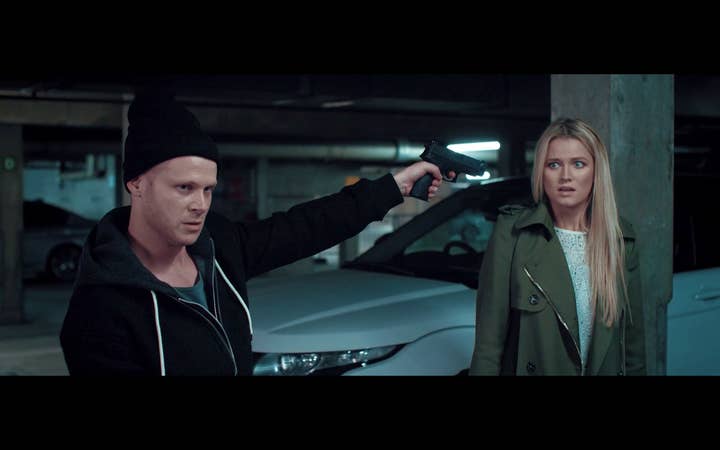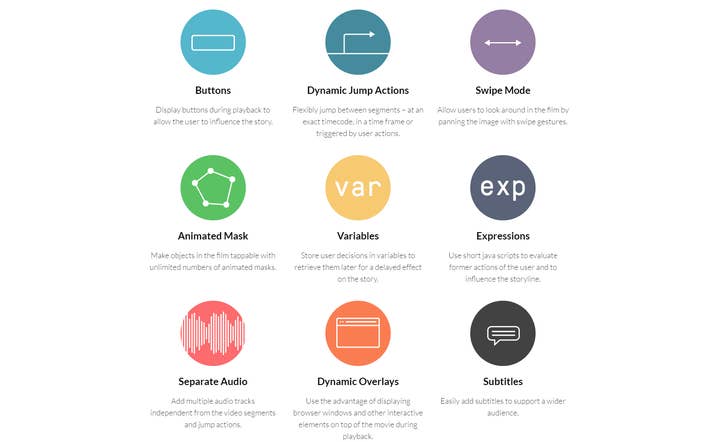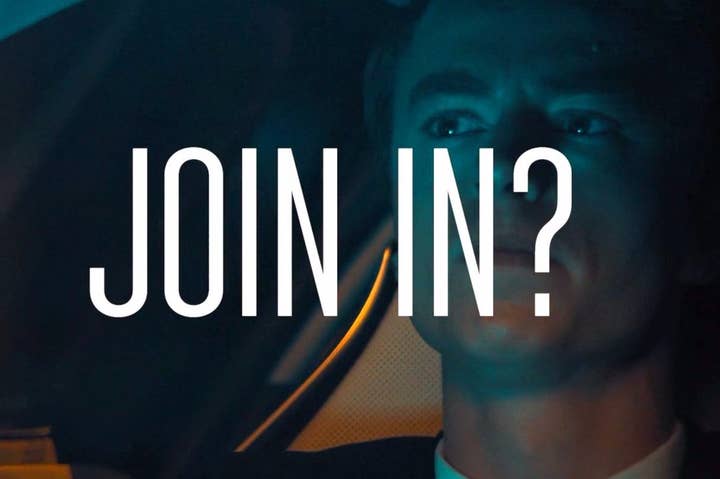CtrlMovie - A film format for interactive storytelling
Associate producer Demetri Jagger talks about a new meeting of media
Short lived as they may have been, laserdiscs ushered in a new era. As big as a dinner plate, this near-forgotten format enabled the storage of unprecedented amounts of information, giving eventual rise to both the CD-Rom and the Blu-Ray disc and changing the face of entertainment forever. And, by offering rapid access to vast amounts of data, laser discs also brought about the concept of the interactive movie.
Like many, my first experience of both interactive movies and laserdiscs was Dragon's Lair - an animated yomp which took advantage of the new data capacity limits to create what was essentially a choose your own adventure cartoon. I was probably about five at the time, but I have a clear memory of the lush 'living room' suite laid out at the local department store, studded with luxury Bose speakers and a huge CRT TV attached to a Philips laserdisc player. Dragon's Lair was terrible, but I'm pretty sure I cried when I had to leave.
From there, the history of the interactive movie becomes a little muddy. Wikipedia lists a wealth of titles which really reflect the changing definition of the phrase, ranging from the notorious Night Trap and the hammy 7th Guest all the way to Life is Strange and Until Dawn, but it feels almost as if it gets less accurate as the chronology progresses. In fact, levelled at some of the more modern examples, the phrase seems more like an insult: "this isn't a game, it's just a film."
The point is that, for gamers, the concept itself isn't always an attractive one. If what you want is a game, then having to sit and watch stuff just happen without any input isn't really what you're after. From our side of the fence, interactivity is generally king, but it's impossible to deny just how much games have learned from film - whether it's the proper direction of cinematics, the construction of dialogue or proper lighting techniques, games are much richer for the relationship.
"I've encountered a lot of suspicion, which has been interesting. A lot of shock that we actually managed to achieve it"
Largely, though, it's been a one-way street. Whilst games have adopted many of the things which made cinema great, there hasn't been much reciprocation.
CtrlMovie is attempting to redress that balance. A new platform for creating live-action film with deviating plotlines, CtrlMovie offers the audience the chance to make significant plot-changing decisions in real time, under the same pressure as the characters, with indecision having its own consequences. The company's first proof-of-concept title, Late Shift, is available now on iOS and Android but has also been touring the film festivals of the world and appearing in selected cinemas, giving audiences the chance to exercise democratic power over the big screen. Associate producer Demetri Jagger says it's a delicate proposition.
"I've encountered a lot of suspicion, which has been interesting. A lot of shock that we actually managed to achieve it. As you said, it's something that's been touted around for a while. Getting it into the cinema has been incredible, because it allows people to share that experience. With iOS people do it differently - they watch the film four or five times to get the different endings. You don't tend to get that from cinema audiences. People will watch a film multiple times with the big classics, or as kids, but as an adult, people do that less.

"There's almost a disappointment in cinema at the moment, because it's quite a strict medium. People love something like Game of Thrones because you get this extended character arc - you really get to know them. If you watch Batman Vs. Superman, you might just be bored for an hour and a half. In games, you have total control, but after five minutes of playing, say, GTA, I'm literally just running down the street, I'm not interacting with anything anyway. I'm just on a treadmill, you can't go to a table and interact with what's on it - it all starts to feel completely pointless.
"The interesting thing with film, particularly with Ctrl-Movie, is that we're not really taking anything away from that experience, we're just making a lot of it less irrelevant. It's not about exploring a whole area, it's about making those character decisions. People are more forgiving because it's a film - they can explore everything with their eyes, but they don't feel like they're going to be forced to talk to 12 people to find the right one. They are given choices which don't lead anywhere, and there is frustration, but with live action we've got a little bit of latitude.
"You can always add more choices in, but you might find it detracts from the situation. Sometimes more is less - you don't get to choose which way to go on a rollercoaster, but you wouldn't say they were boring. I'd be interested to see how an animated project would work and if those rules would still apply.
"games, unfortunately, have had their cinematic experiences designated as something like bookends between levels, which can work quite well in something like DOOM, but can drag on if it doesn't work"
"I don't feel intimidated by any of that. First of all games, unfortunately, have had their cinematic experiences designated as something like bookends between levels, which can work quite well in something like DOOM, but can drag on if it doesn't work. If the player is less than enthralled by the story line, it can really drag on. There's also the opposite problem of what we discussed earlier - people want huge amounts of gameplay from games. They want 300 hours in order to feel like they've 'got their money's worth'. People want a two hour experience from a film, at most usually.
"I think Max Payne worked quite well, that was essentially a revenge flick. But there were complaints that it was too short. There's really only so many things that can happen in a revenge flick. Within film, it works really well, even within a format like that, it seems to make sense."
The influence of games and other forms of interactive fiction on the project is obvious - and many of the ideas present in the film stem from the same cultural framework. Late Shift's decision tree has more than a touch of Bioware about it.
"I know that choice was a passion of his," Jagger says of Late Shift's director, Tobias Weber. "It's something he's focused on for a very long time. He's very talented and this is what he wanted to do - he's always pushing the boundaries of his skill set...I've always been very impressed by that, which is partly why we became very good friends at film school. He has a fascination with it, being able to direct what's going on - he just wants to do something special. He loves exploring character and the consequences of actions, which I think is why he became a film director."

"In the film itself, he devised a system whereby, if you're selfless, you get better results for your character, but if you're selfish you have a less satisfying ending," Jagger explains. "But so far in most of the cinema screenings, at least the ones I've been too, people are actually pretty selfish.
"One of the interesting things we're doing is that these decisions roll on - they have this knock on effect much further down the line. Often in games, which I'm not detracting from, you have shorter mission bases, so you don't have time for that deferred reward - there's a shorter loop. I find it really interesting. As a new format, you have to educate your audience - there's certain people who get it straight away and some who don't. Sometimes the audience sort of misses it. We're a small company, so what we've developed takes time to work. We're sort of having a new market experience. People who wouldn't normally play games and people who don't watch much film are both enjoying it. It's interesting."
Even as an interesting project in its own right, Late Shift is still the shop window. Jagger says that the growth of the platform is the core goal of the company's future, hopefully encouraging a new level of cross-pollination between the disciplines of games and film.
"Indie film makers have a lot they can learn from indie game makers. I'm really interested to see that amalgamation. I want to see game makers start to use our product so we can learn from them"
"I think if we came at it from a perspective of a huge conglomerate we would have a different approach," he explains. "At the minute we're focusing on the festivals, but we're educating a new market. The product is fantastic but we don't have a huge amount of money to spend on the P&A, so we have to do it pretty efficiently. We're also just about to launch on Apple TV. The cinema app is quite different from the phone experience. It wasn't really intended as a cinema experience, but it's a great way to reach a wider audience. Right now is the time for this film to shine. Not detracting from that is important, but there's a pretty strict gameplan.
"More films. Different genres, different areas, partnering opportunities - with film makers or games. Letting people get their products out there without all that time on development. In film, it can be quite tough - having several million pounds isn't even a guarantee that anyone will ever see your film. This can help make that guarantee. Reaching out to filmmakers is a time-consuming business though, so Late Shift is a bit of a proof of concept. We're a small company, we're all wearing many different hats.
"We have to give the product the opportunity, then we can engage with other filmmakers, then we can start engaging with investors, thinking about other films. Everyone wants to reach out to a larger market, it's money. Games are a new market, relatively. The indie game market is maybe 30 years old - indie films are older, but they haven't had that ability, they've been squeezed out of that opportunity. Indie film makers have a lot they can learn from indie game makers. I'm really interested to see that amalgamation. I want to see game makers start to use our product so we can learn from them, but I feel we have a huge amount to offer the film side, too."









